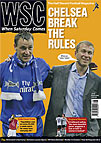 Everton took home the spoils a year previous but 1985-86 was to be Liverpool's season as Graham Hughes recalls
Everton took home the spoils a year previous but 1985-86 was to be Liverpool's season as Graham Hughes recalls
The long-term significance
1985-86 was the first of five consecutive seasons in which English clubs would be banned from European competitions, in the wake of the Heysel disaster at the end of the previous season. The Bradford fire was also fresh in people’s minds and, with politicians and club chairmen threatening a host of draconian measures to combat hooliganism, English football went into the new season in a decidedly sober and chastened mood.
Story of the season
Ron Atkinson’s Manchester United got off to a blistering start, winning their first ten games. Football writers at the north-west editions of the tabloids, salivating at the prospect of the title returning to Old Trafford after a 19-year drought, didn’t bother with the formalities of waiting to see what would happen in the remaining 32 games (“It’s All Yours, Ron!” was a particularly memorable headline).
United’s subsequent collapse, however, was so spectacular that they were virtually out of contention by February. Liverpool and the reigning champions Everton became the front-runners, prompting grumbles about a “Mersey monopoly”, with surprise package West Ham close behind. There was nothing in it until the pivotal night of April 30, when Liverpool cruised to a 2-0 win at Leicester while Everton lost 1-0 at lowly Division One newcomers Oxford, leaving them five points behind with two games left.
Liverpool only had one match to play, but it was all they needed. A 1-0 win at Chelsea meant that their rivals’ 6-1 thumping of Southampton counted for little, although Everton’s win over West Ham in their final game secured second place. Evertonians’ agony would continue, as Liverpool went on to wrap up the double with a 3-1 victory in the all-Merseyside FA Cup final.
Ipswich’s 18-year run in Division One came to an end, with four defeats in their last five games condemning them to relegation alongside Birmingham and West Brom. The latter had been anchored to the bottom since August and had got through five managers in as many years since Ron Atkinson’s departure for Old Trafford. Ron Saunders, a League winner with Villa in 1980‑81, was in charge when they went down.
There was no television coverage of the first half of the domestic season, after the club chairmen had turned down a joint offer from the BBC and ITV of a four-year, £16 million deal the previous February. West Ham’s Frank McAvennie, signed from St Mirren in the summer, had a prolific first season in England (on and off the pitch), but to many football fans he was an almost unseen, semi-mythical figure until the game returned to our screens in January.
For the record books
Gary Lineker, in his only season at Everton, was leading scorer with 30 league goals (40 in all competitions), before scoring six times in the World Cup finals and moving on to Barcelona. Kenny Dalglish became the first player-manager to lead a team to a Division One title, which he clinched himself with the winning goal at Chelsea.
Same place today
Five teams haven’t left the top flight: Arsenal, Everton, Liverpool, Man Utd and Tottenham; Southampton have just left that list. Seven others – Aston Villa, Birmingham, Chelsea, Manchester City, Newcastle, West Brom and West Ham – have been relegated and are currently back there.
Moved furthest away
Oxford clung on to their Division One status until 1988. After a gradual decline, they found themselves just 11 points clear of relegation to the Conference in 2001-02.
Went on to greater things
David Seaman ~ Though Birmingham went down in his first season of top-flight football, the future Arsenal star stayed up by moving to QPR. Currently laughing inanely on a clapped-out quiz show.
John Aldridge ~ Helped Oxford to stay up and win the League Cup, a year before joining Liverpool.
Paul Gascoigne ~ Became a regular in the Newcastle midfield. Currently trying to work out who he is.
Steve Bull ~ Made his League debut, his only appearance in West Brom’s relegation campaign and his only top-flight game. But a move to Wolves a year later kick-started his career.
Disappearing from view
Alcohol ~ No longer allowed on the terraces or in the stands, or on coaches and trains travelling to and from matches, thanks to the 1985 Sporting Events (Control of Alcohol) Act.
Nobby Stiles ~ The World Cup winner had an ill-fated spell as West Brom manager, with just three wins in 21 games.
Tony Woodcock ~ The former England striker left Arsenal to rejoin Cologne and stayed in Germany for many years.
Pat Jennings ~ The legendary keeper ended the season as an unused back-up at Everton, before ending his career at the World Cup on his 41st birthday.
From WSC 222 August 2005. What was happening this month